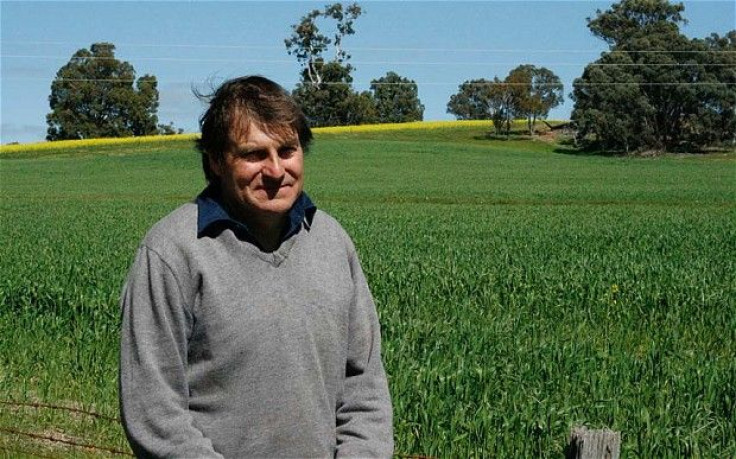Australian GMO 'Contamination' Case Could Have International Repercussions

Australian farmers Steve Marsh and Mick Baxter grew up together, were once schoolmates, and have grown crops on their neighboring farms for years.
But the emergence of GMO technology has driven a wedge between the longtime friends, leaving them embroiled in a legal battle being closely watched by bioengineering advocates and opponents from America's breadbasket to the Outback.
The issue at hand is GMOs "contaminating" organic crops, a concern that divides agricultural experts, Big Ag companies and farmers. The Aussies' lawsuit is being described as the first of its kind, a bellwether of sorts for the controversy over GMOs, but international media coverage of the case -- in which a ruling by the Supreme Court of Western Australia is pending after the trial concluded Feb. 28 -- has been limited.
Marsh, who farms organic sheep and oats, is suing Baxter for nearly $80,000 in damages he says he sustained after the organic certification of 70 percent of his farm was revoked in 2010 when genetically modified material from Baxter's Monsanto Co. (NYSE:MON) Roundup-Ready Canola plants was found on Marsh's farmland.
The Australian government does not certify organic crops, so the task is left to the National Association of Sustainable Agriculture, Australia (NASAA), a private outfit that has declared that the presence of even a tiny amount of GM material is enough to qualify an organic field for de-certification. Most countries, including the U.S. and the E.U., allow organic certified crops to contain trace amounts of GM material, due to the fact that is essentially impossible to keep a farm entirely pure.
If Marsh wins his case, some observers suggest that the verdict could prompt discussions around the world about whether to re-evaluate organic certification processes and rules about how responsible conventional farmers should be for their impacts on organic farms.
Karinne Ludlow, a law professor at Australia's Monash University, told the Telegraph newspaper that the decision could help determine “whether GM agriculture can co-exist with organic agriculture."
Beyond the loss of Australian organic certification, which brings with it the inability to sell crops at the premium price that it yields within the country, presence of GM material can also lessen organic products' value in other nations' markets, or even lead to shipments being turned away. In just the past two years, China has rejected multiple shipments of American corn and Japan and South Korea halted American wheat shipments after an Oregon wheat farmers's field tested positive for the genes of an unapproved Monsanto GMO wheat variety.
As such, the Western Australia case could have major economic impacts if it sets a precedent that is followed by other courts within the country and beyond. The low dollar amount of the damages sought by Marsh, combined with the local nature of the suit, might have allowed it to go mostly ignored beyond the rural Australian community where it is being litigated, were it not for the white-hot nature of the debate over GMOs, as well as the powerful backers that have signed on to provide legal assistance.
Legal experts estimate that Marsh and Baxter are racking up millions of dollars in legal fees during the lengthy case. But Marsh has the backing of a crowdsourced funding drive and advocacy groups like Australia's anti-GMO Safe Food Foundation, while Baxter is being supported by Monsanto and industry groups. The spotlight such groups and companies bring has helped propel the case to prominence within agriculture and food safety circles, and players from Iowa to Perth are fighting hard to ensure that the court rules in favor of their point of view.
Leading American anti-GMO food advocacy group Food Democracy Now! has been vocal about the importance of the case, drafting a petition supporting Marsh that has been signed by more than 60,000 people. Dave Murphy, the group's founder and executive director, says the case could have far-reaching consequences for the agriculture industry.
"It’s a really important case because there have not been farmer vs. farmer lawsuits over contamination, and this could set a major precedent for contamination that would have international implications," he said. "Contamination of non-GMO crops is inevitable, and Monsanto knows this."
But pro-GMO groups like BIO, an American trade group representing major biotech players including Monsanto and Swiss-based Syngenta AG (VTX:SINN), say Baxter should not be held responsible for Australia's unrealistic zero-tolerance policy on GMOs in organic foods, and even take issue with the use of the word "contamination." Karen Batra, a spokeswoman for the group, says commingling of various crop varieties is a safe and natural part of agriculture.
"First of all, this is not a safety issue because if that biotech is already being grown, it has already been authorized," she said, adding later that, "Even before the advent of biotech it's important to remember that farmers have had to coexist for generations ... Any type of crop has to learn to get along with another crop, so you have coexistence no matter what."
The Supreme Court of Western Australia has not said when it will rule on the case.
© Copyright IBTimes 2024. All rights reserved.











